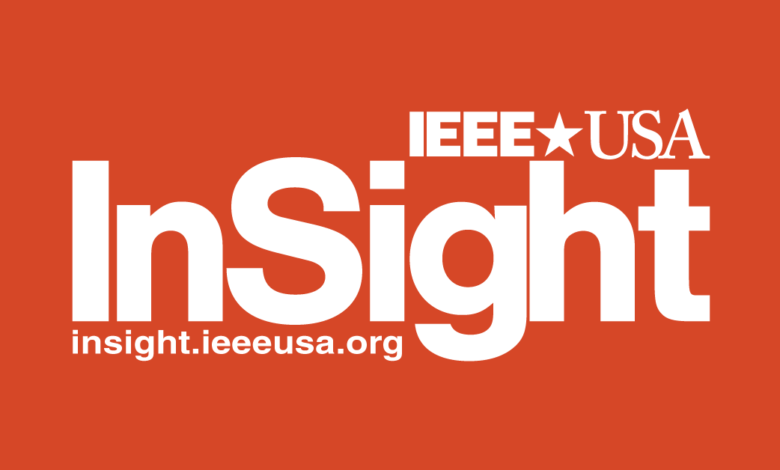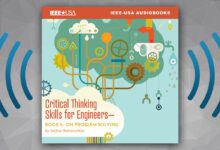
That legendary philosopher of the baseball mound, Casey Stengel, once famously advised, “Never make predictions ” especially about the future.”
Sorry, Casey, but if the success of this year’s WISE internship program, and in particular, the three engineering students sponsored by IEEE-USA are any indication, the future is in some very capable hands.
Since Washington Internships for Students of Engineering (WISE) began more than 30 years ago, the program has trained hundreds of the brightest engineering students from across the United States for a future in public policy. The students spend nine weeks during the summer in Washington, D.C., where the seven current sponsoring societies (IEEE-USA among them) ensure they get a first-hand view of the junction between engineering and public policy. During interactions with leaders in the U.S. Congress, the administration, federal agencies, industry and non-governmental organizations, the interns learn how government officials make decisions on complex technological issues. To give the students further insight on how engineers can contribute to legislative and regulatory public policy decisions, each also researches, writes and presents a paper on an engineering-related public policy issue that concerns the sponsoring society.
This year, IEEE-USA sponsored three WISE interns: Turner Cotterman, electrical engineering major with an emphasis on renewable energy, at Clemson University in Clemson, South Carolina; Alexandra Quay Nilles, engineering physics major at Colorado School of Mines in Golden; and Lucas Wadman, electrical engineering major at Colorado State University in Fort Collins.
All began their internships in June, when they shared some thoughts with IEEE-USA in ACTION about their WISE internships, their aspirations–and themselves.
Where are you from? And what do you like best about your home town?
Cotterman: I’m from Greenville, South Carolina, and I most like the diversity of the community. The BMW plant in the area has created a fairly heavy German influence that I enjoy, and there’s also plenty of art and culture.
Nilles: I’m from Arvada, Colorado, and its location couldn’t be better. Arvada is close to Denver, and all its big-city advantages, but we’re also near the mountains for camping and hiking. Arvada offers the best of two ways of living.
Wadman: My hometown is Corvallis, Oregon. For me, the best thing about it is the variety of outdoor activities available. Growing up, I went on a lot of family camping trips–from the beach to the Cascade Mountains. Plus, the Northwest is a pretty gorgeous part of the country.
Prior to your WISE internship, had you visited Washington, D.C. before? What has surprised you most about living here for the summer?
Cotterman: I’d visited on family vacations, and earlier this year I also came with the Sierra Club to protest the Keystone XL pipeline at a rally around the White House. What has most surprised me is the amazing cultural diversity. When my dad accompanied me to Washington to start my internship, we ate at a Ghanaian restaurant the evening we arrived.
Nilles: I visited Washington on an eighth grade school trip. I’ve been surprised by how much fun it is to live in a big city, and the many free concerts, and other things to do. Also, I’d expected people to be in a big rush and not very helpful. But everyone I’ve met has been very welcoming.
Wadman: This is the first time I’ve lived in a big city, although I traveled to several on the East Coast to tour some universities before high school graduation. The heat and humidity surprised me; I knew to expect it, but coming from Colorado, it really took me off guard. Also, unlike Fort Collins, I can’t walk everywhere, and public transportation is very important. The D.C. Metro is much nicer than any other I’ve experienced.
Why did you apply for a WISE internship and how do you expect to benefit from it?
Cotterman: I’m starting to think about graduate school, and I’d like to concentrate on business or public policy. Two of my Clemson friends were in the WISE program last year, and they recommended it. I want to learn how public policy operates, so WISE is a perfect fit. I haven’t taken anything like it in school, and I want to see how this experience relates to my career path.
Nilles: At CSM, I’m in the McBride Honors Program, which focuses on providing scientists and engineers with a well-rounded liberal arts education. Through McBride, I’ve become more interested in big-picture issues like public policy. On campus, the engineers I talk with all say they’ll come up with solutions, and then get others to accept them–but it’s not that easy. An issue has many sides, and you have to consider everyone’s viewpoint.
Wadman: I’m really interested in getting a cross-disciplinary education, and what really appealed to me is the whole public policy process, which brings together many different disciplines. I want to supplement my CSU education with different experiences. The WISE program really appealed to me, because the whole public policy process brings together many diverse fields.
What topic are you working on for your paper and presentation?
Cotterman: I am researching new ways of thinking that will transform the energy industry to be predictive, modern and innovative. One way to do this is to incorporate renewable energy sources as part of the energy storage systems in the Smart Grid. Sustainable, clean, secure and cost-effective energy is an essential enabler–at all levels–of economic performance, market competitiveness and social prosperity.
Nilles: My research is on policy solutions for optimizing grid design; specifically, those that would reduce power outages and help improve grid response when outages do occur. Maintenance costs are going up, while power outages and downtime are becoming more common. We can create a more stable and secure electricity infrastructure by incorporating smart grid technology like digital meters.
Wadman: I am researching policy recommendations to protect America’s standing in international Internet governance negotiations. My paper will explore both a continued open Internet, and the so-called “Splinternet” approach, where the state is the primary Internet curator within a country’s borders. The United States has advocated maintaining the status quo; but many factors, including the failure of recent international governance talks and revelations about domestic electronic surveillance by the NSA, could impact our nation’s position.
What do you hope to learn from the internship experience?
Cotterman: Because I’m so passionate about renewable energy sources, I hope to learn more that I can apply to what I hope will be my eventual work–the worldwide implementation of renewable energy systems. But the field is still evolving, and things are changing. I also want to build my network of contacts through my research subject.
Nilles: This is an awesome opportunity to learn more about public policy, how the system works, and whether I want to pursue it further. I could hang out in Colorado and just read the news–but there’s nothing like meeting and talking with the people who actually make the policy and are in the news.
Wadman: The WISE internship should give me a much better appreciation for the complexity of the issues our government deals with. Every elementary school teaches students how a bill becomes law, but I think this internship will show me the intricacies of the process. This should help me decide whether my graduate studies will focus on public policy as it applies to technology.
How do you see your career unfolding once you’ve completed your studies?
Cotterman: I hope to work on the worldwide implementation of energy systems, but on the policy side. My engineering studies will help me to better understand technology policy.
Nilles: I’m not sure yet what I want to do, but it could involve computational physics, or quantum computing. Quantum is theoretical, but I would love to use it to help advance computer technology.
Wadman: It would be interesting to work on some kind of policy, or in industry developing products relating to education. I’d like some sort of tangible give-back, involved in education without being an educator–perhaps working with universities to help them with technology.
How do you expect to spend your free time in Washington this summer?
Cotterman: I’m continually updating my to-do list. Besides lectures and hearings relating to my research topic, I’m going out of my way to meet with legislators to improve my knowledge base. But I’m also looking forward to exploring the Smithsonian, and going on runs throughout the city.
Nilles: I’m a history buff, so this is a great city for me with all the museums and monuments. I’m also interested in the live-music concerts that are available, many of them free.
Wadman: I’m a big jazz fan, and almost every evening there are small, free jazz concerts all over the city. I want to see as much of the Smithsonian as I can. Also, I’m a runner, so runs around the National Mall, and along the C&O Canal, are possibilities.
Helen Horwitz is an award-winning freelance writer who lives in Albuquerque, N.M. She was with IEEE from 1991-2011, the first nine as staff director, IEEE Corporate Communications.






